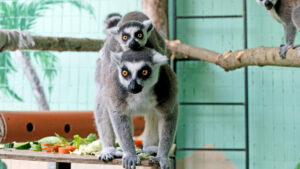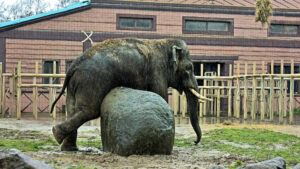17 year-old Sofia Radysh reports on the plight of the animals in Ukrainian zoos
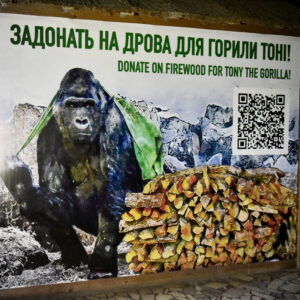
In the winter, the Kyiv Zoo fundraised for firewood necessary to keep Tony the Gorilla warm.
October 27, 2023
Ukrainian zoos are battling to care for animals amidst the ongoing war
The full-scale invasion has impacted the lives of all Ukrainian citizens, but it is not just people who are suffering from the consequences of the ongoing conflict.
Our four-legged friends have also been affected by the war. Zoo animals that are supposed to be protected and cared for are also being subject to stress and turmoil.
‘Ex situ conservation’ is the technique of conservation of all levels of biological diversity outside their natural habitats, for example in zoos. It is one of the most popular conservation techniques.
Ukraine has seven zoos of national importance in different parts of the country, additionally to around 20 smaller zoos, as well as establishments with captive wild animals. The war has affected conservation in Ukraine due to its impact on ecology, pollution, and physical risks to people and animals due to the shellings.
Some animals have been relocated to various zoos in Poland for their own safety, but as it is not possible in every case.
Many zoos in Ukraine are still battling the never ending consequences that the Russian aggression brings. Many large zoos in Ukraine have spoken out about the potential relocation of animals to other countries and how this might be harmful for them.
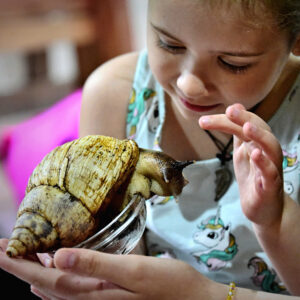
A child refugee with an animal from the Kyiv Zoo. The public institution organises psychological support sessions for those affected by the war.
Because of the constant stress they experience on a daily basis, loading the animals into crates and transporting them is not considered to be the best solution. While increasing stress for the animals, there are also a lot of logistical details that may not work out.
Even during peaceful times moving zoos is a very complicated task as neighbouring zoos may not have the capacity to accept more animals or have enough staff to take care of the new additions.
Research has also suggested that the pre-established relationships of animals to keepers might be ruined and therefore affect the welfare of animals and cause distress.
As for those animals who are still residing in Ukrainian zoos, there are concerns over their reaction to the sounds of war.
It is commonly known that zoo animals are used to the regular amount of noise visitors make and it doesn’t impact their behaviour. Animals living in zoos can adapt to a lot of things including new noises, because of their ever changing environment, as well as things constantly happening around them.
While research has not yet been conducted into how Ukrainian animals in zoos cope with the everyday noise of the full-scale invasion, similar research has been conducted exploring the impact construction site noises have on animals.
In 2019, a major construction project was planned at New Zealand Zoo so researchers decided to look at the different behaviours exhibited by various species. Giraffes, elephants and emus who were exposed to the loud sounds from the ongoing construction displayed behaviours that could indicate stress and agitation and tried to find quieter areas in their close proximity during sound exposure.
The scale of the war is greater than construction work and therefore noise pollution is higher as well. The Kyiv Zoo has told Discover Magazine that some of the animals received sedatives and were moved underground at night to keep them safe during shellings.
After a shelling in May, pieces of a rocket fell onto the territory of the Kyiv Zoo. Though none of the animals were harmed, they were stressed and hid after the attack. And this is only one of many examples where the war has affected animals in conservation on Ukrainian territories.
In an interview Yevgen Kiosya, a senior lecturer of the biology department in Kharkiv National University, gave to Kunsht last year he mentioned how even if the war had not impacted the animals in the Kharkiv Zoo directly ‘something is happening anyways’.
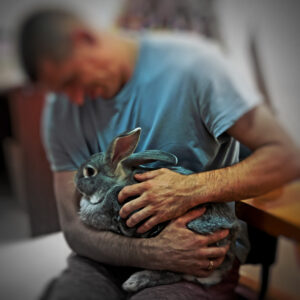
A war veteran with an animal from the Kyiv Zoo. The public institution organises psychological support sessions for those affected by the war.
Due to some houses of the zoo workers getting damaged or destroyed, some of them moved to live at the zoo. All of this impacts the zoo, as it has specific rituals and schedules it operates by, which are disturbed.
The whole ecosystem is out of order. Because of that, some of the animals got so attached to their keepers ‘they would only accept food from them and won’t come up to someone unknown to them’.
So when the personnel of the zoo changes s0me animals may ‘starve for a week or even more’ until they get used to the new keepers.
Since September 2022, the Russian military has caused power outages all around the country by purposefully targeting the energy infrastructure of the country.
Said power outages have led to many animals dying in conservation and in farms. Due to the lack of support provided for the animals, and often much lower temperatures caused by the absence of electricity and heating, last winter the Kyiv Zoo reported that they are using a wood-burning stove to keep animals warm.
One of these animals is Tony, the only gorilla in Ukraine that recently turned 49, as well as other African primates and tropical animals.
One zoo worker noted that when the temperature drops or there is no light, primates become less active and stop eating. The solution they found is the installation of battery-powered lights and in order to keep the desired temperature of 20°C for the animals, the stove was installed, allowing them to maintain constant temperatures.
The full-scale invasion has already taken a toll on animals in Ukraine, animals that left Ukraine, and even the biosphere in general. Conservation sites and national parks have been destroyed, thousands of animals have died, those in ex situ conservations have suffered, and unfortunately still are.



